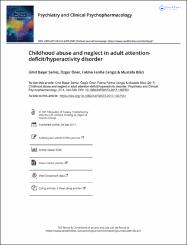Childhood abuse and neglect in adult attention-deficit/hyperactivity disorder
Özet
Objective: Although it has been suggested that attention-deficit/hyperactivity disorder (ADHD) is common in children who were abused and that ADHD can be a risk factor for abuse itself, there are very few studies which investigated whether adult ADHD is associated with childhood abuse and neglect. The aim of this study was to fill this gap in the literature. Method: Seventy adults with DSM-IV ADHD diagnosis and 70 healthy control subjects were included in the study. We used Adult ADHD Self Rating Scale (ASRS) and Wender Utah Rating Scale (WURS) to support the diagnosis. All subjects were assessed using Childhood Trauma Questionnaire (CTQ), Adverse Childhood Experiences (ACE) Scale, Post-traumatic Stress Disorder Checklist (PCL), Dissociative Experiences Scale (DES), and Symptom Checklist-90Revised. Results: ADHD subjects had higher ASRS inattentiveness, hyperactivity/impulsivity, WURS, and Symptoms Checklist-90 (SCL-90) General Symptom Index scores than controls. ADHD group also had higher PCL, DES and ACE scores. In CTQ, ADHD subjects had higher emotional abuse and neglect scores than control subjects. ASRS and WURS scores were correlated with PCL, ACE, CTQ Emotional Abuse, and DES scores; WURS score was also correlated with CTQ Physical Abuse and Neglect scores. Regression analysis indicated that general level of psychopathology was most significantly associated with DES and PCL scores. Conclusions: Results suggested that ADHD cases were more commonly exposed to emotional abuse and neglect. They had significantly more dissociative experiences and reported Posttraumatic Stress Disorder (PTSD) symptoms more frequently. The results pointed to the importance of childhood traumatic and adverse experiences in adults with ADHD.


















